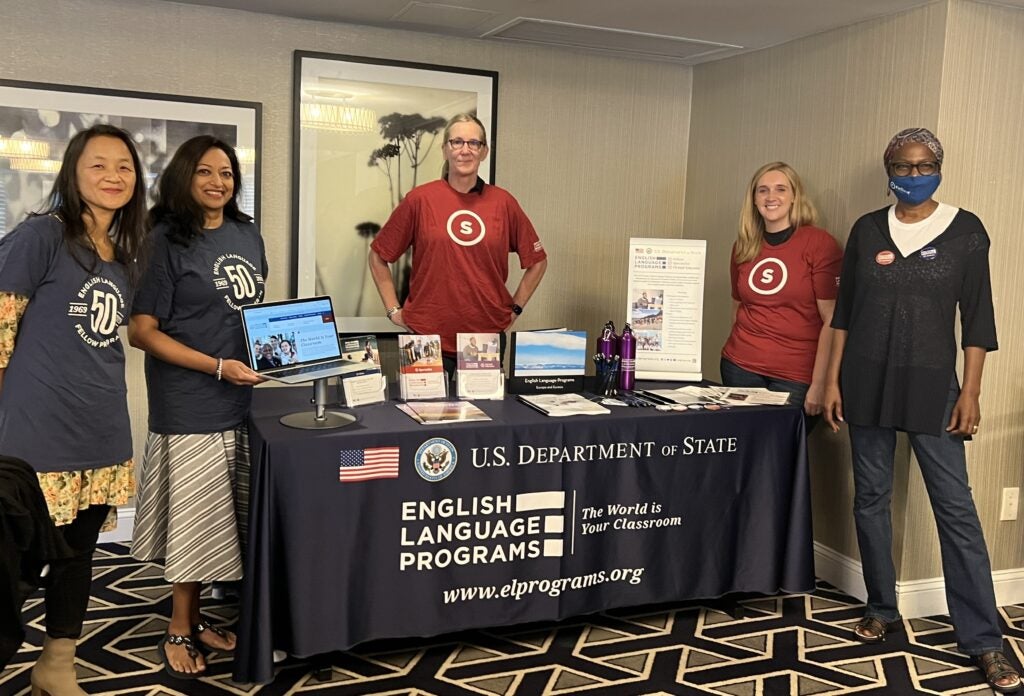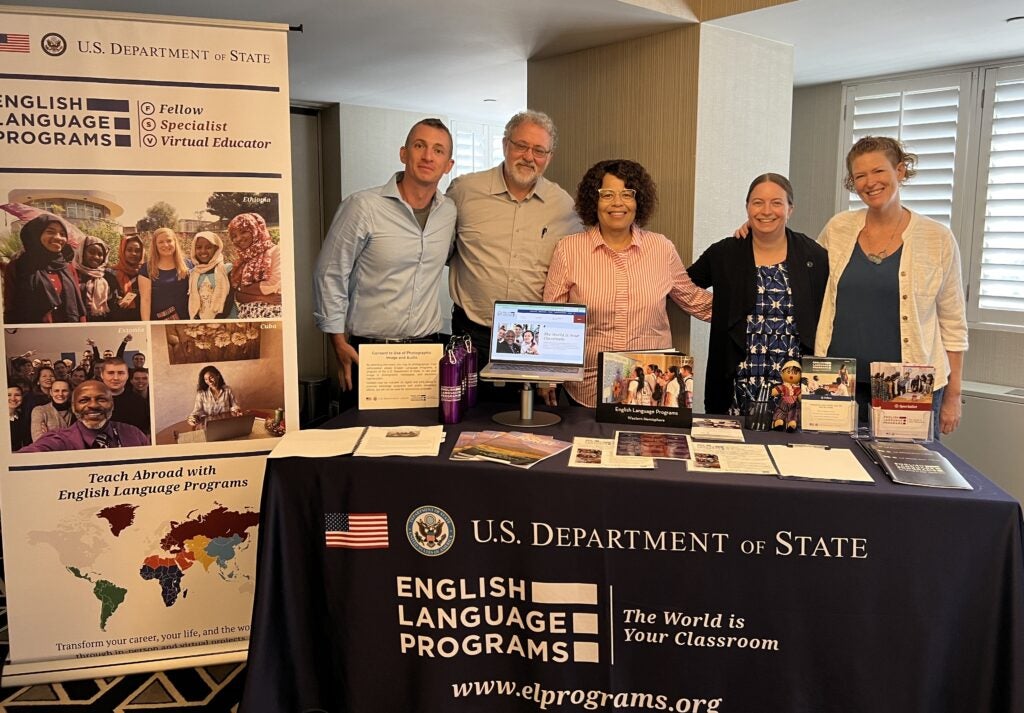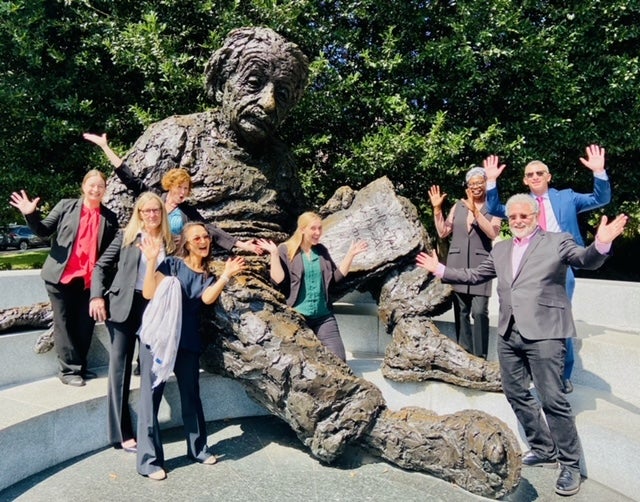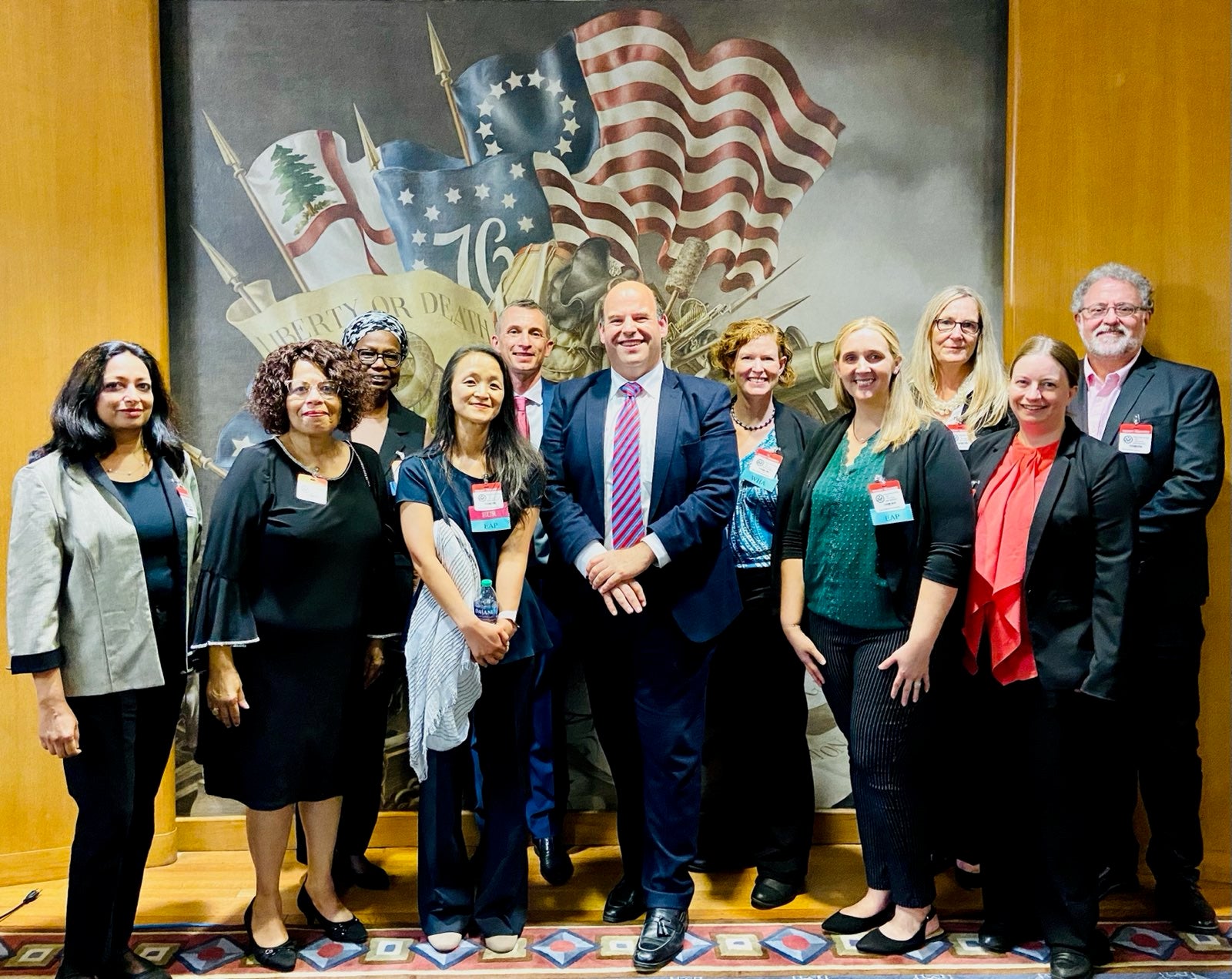English Language Programs sends top-tier TESOL professionals from the U.S. to countries around the world, allowing for an exchange of expertise.
Joe Bookbinder, Director of the Office of English Language Programs at the U.S. Department of State
How do you describe an experience that transforms your entire worldview? The 2022-23 Alumni Ambassadors have a few short but compelling suggestions, terms they use to convey the impact of their tenures as Fellows, Specialists, and Virtual Educators for the U.S. Department of State’s English Language Programs. “Incredible.” Life-changing.” “Formative” “Mind blowing.” “Indelible.” These ten Ambassadors, a diverse group of educators selected from the largest pool of applicants – 78 – since the Alumni Ambassador Program’s 2016 inception, have certainly proved their mettle, facilitating English language education with enthusiasm and determination in countries across the globe, both in-person and virtually.
“English Language Programs sends top-tier TESOL professionals from the U.S. to countries around the world, allowing for an exchange of expertise,” says Joe Bookbinder, Director of the Office of English Language Programs at the U.S. Department of State. “The Alumni Ambassador Program enables us to then showcase these outstanding American teachers and share their experiences back home, to the American public, furthering the goal of cross-cultural exchange and mutual understanding.” Indeed, these Ambassadors are fully prepared to tackle their responsibilities as representatives of English Language Programs – attending conferences, building relationships with other educators, engaging with program alumni, and, of course, telling their own stories.
Stories to Tell
And what stories this carefully chosen group of alumni have to tell, not only about their time as educators with English Language Programs, but also about the professional opportunities that sprang directly from their program participation. For example, Dr. Adrienne Johnson, chair of the Education Department at Missouri Western State University, notes that her experiences as a Specialist in Egypt, Taiwan, and Kuwait not only strengthened her content knowledge but also honed her professional presentation skills. Since her first Specialist project in 2019, she has given live and virtual keynote addresses at international conferences and delivered numerous virtual workshops, including her first American English Facebook webinar. Upon Ollie Rashid’s return from her fellowship in Guinea, she soon advanced from full-time ESL instructor to assistant professor and coordinator of the ESL program at Bluegrass Community & Technical College in Kentucky.
For Dr. John Bunting, principal senior lecturer and director of the Intensive English Program at Georgia State University, each Specialist project has led to lifelong friendships – both personal and professional – across the globe. A needs assessment in Tanzania, for instance, led to an online course, followed by a MOOC for health professionals across Africa. Dr. Amy Burden credits her fellowship in the Philippines with providing her with the experience needed to land her current position as an ESL Assessment Specialist at University of Michigan. Kim Carroll, director of the English for Life Academy in Greenville, S.C., notes that her time as a Fellow and Specialist in Paraguay gave her the experience and self-assurance to expand her business into corporate training. And, inspired by her fellowship in Guatemala, Dr. Cristyn Elder applied to and completed a doctoral program when she returned to the United States, which led to her current position as a tenured professor at University of New Mexico. As she stated on her Alumni Ambassador Program application, “I have the best of both worlds: a full-time job I love…that also provides me with the flexibility to stay active and up-to-date with the English Language Programs community.”
I have the best of both worlds: a full-time job I love…that also provides me with the flexibility to stay active and up-to-date with the English Language Programs community.
Dr. Cristyn Elder, Alumni Ambassador
Professional Growth and Personal Journeys
While Alumni Ambassadors take great pride in the professional growth that resulted from their English Language Programs assignments, they are equally appreciative of the outward and inward journeys they took during their time as program educators. The phrase “first time” often figures into the tales these alumni tell about their experiences. In Paraguay, Carroll created and ran the first English Teacher Camp for public school teachers in that country. In Guinea, Rashid, working with the International Book Project and Guinea English Language Teachers Association, facilitated the donation of more than 2,250 English language textbooks, novels, and children’s storybooks to students and teachers throughout the country and to her host institution, University of Kofi Annan.
As a Specialist in Tajikistan, Elder led a three-week teacher training in a former Soviet sanatorium high in the mountains, where she bonded with Tajik English language instructors as they worked together to update and supplement material in the communist-era English language textbooks still used in that country. Dr. Nina Kang undertook an intensive Specialist project in Vietnam to design and develop an English language curriculum that would meet the country’s national standards for English language competency for seven English for Occupational Purposes disciplines. And Fellow Avram Tepfer organized and led a Massive Open Online Course (MOOC) that trained teachers across Kazakhstan to facilitate in-person sessions to supplement that country’s existing media literacy, and science, technology, engineering, and mathematics (STEM) MOOCs.

Some alumni speak of less tangible results that grew out of their assignments. Natasha Agrawal, a long-time English language teacher in New Jersey’s public schools, directly links her immersion in a foreign culture during her fellowship not only to her renewed enthusiasm as a teacher and learner but also to a better understanding of herself as an Indian American. Kang attributes her fellowships in Bulgaria, Serbia, and Montenegro with teaching her the value of finding a common language with which to communicate across cultures, while Carroll ascribes her increased comfort with unfamiliar situations and subsequent adaptability to her years as a Fellow and Specialist.
Trailblazers in Virtual Education
Several of these Ambassadors also helped change the structure of English Language Programs itself when the global pandemic required them to quickly pivot their overseas fellowships to the virtual realm. Caught mid-fellowship in Egypt when the pandemic struck, Agrawal returned to the United States and promptly adapted, mastering online tools and programs so she could continue her teacher trainings at Egypt’s Al-Azhar University from her New Jersey home. When Burden’s in-country fellowship in the Philippines was canceled due to COVID-19, her assignment was redirected to a remote region of the Philippines, Central Luzon, where no in-person Fellow had ever gone due to ongoing political unrest there. Partnering with that country’s Department of Education and Luzon’s Commission on Higher Education, she was able to provide multiple online workshops to bring hundreds of educators in that region up to date on tools for virtual classes. When in-country assignments were no longer possible, Carol Lucas also jumped at the opportunity to teach as a Fellow virtually in Brazil, running English-for-career-development MOOCS for participants seeking professional advancement in the global marketplace.
Initially dubbed Virtual Fellows, these trailblazers were a primary force behind the creation of English Language Programs’ recently inaugurated Virtual Educator Program, which has proved that the mission of English Language Programs, to “send some of America’s best educators to train teachers, teach students, and work side-by-side with other educators around the world,” as Bookbinder describes it, can be achieved to great success online. The Alumni Ambassadors who were at the forefront of this new English Language Programs opportunity regard virtual platforms – like Zoom, Google Meet, and others – as game changers in their work as educators. As Lucas noted in her Alumni Ambassador application, “Connecting with people around the globe and developing new relationships with them via a virtual venue has not only augmented my life personally… but has ‘springboarded’ my professional life to new heights and in fresh directions.”

Representing English Language Programs In-Person and Online
Following a Kick Off event in Washington, D.C., the 2022-2023 Alumni Ambassador team is now fully prepared to tackle the numerous duties that lie ahead. Among those is representing English Language Programs at regional and international TESOL conferences, where they will present at sessions and engage at program booths with visitors drawn by their stories as international educators. With an eye toward recruiting future Fellows, Specialists, and Virtual Educators, they will also partner with programs at educational institutions, building relationships with both teachers and administrators.
While recruitment is central in their role as Ambassadors, also key is engagement with other program alumni, both in person at events and on the English Language Programs’ online Community of Practice (COP), where they will moderate discussions, contribute blog posts, and present on topics relevant to the extensive network of current and past English Language Programs participants. In addition, these alumni will maintain an active presence on social media platforms, posting stories that chronicle their work overseas and connecting with the vast community of English language educators who use social media. This highly accomplished group of alumni is more than ready to take on yet another fulfilling journey with English Language Programs, this time as Ambassadors, promoting an exchange of ideas, practices, and experiences in global English language instruction.


